Talking Shop
On our talking shop episode this week, Ashley talks about an amusing grammar book titled ‘Woe is I: The Grammarphobe’s Guide to Better English in Plain English’ by Patricia T O’Connor. And Sarah reviewed a book on horror writing called ‘Writing in the Dark’ by Tim Waggoner.
Also, as always listen in for the novels we’re reading this month!
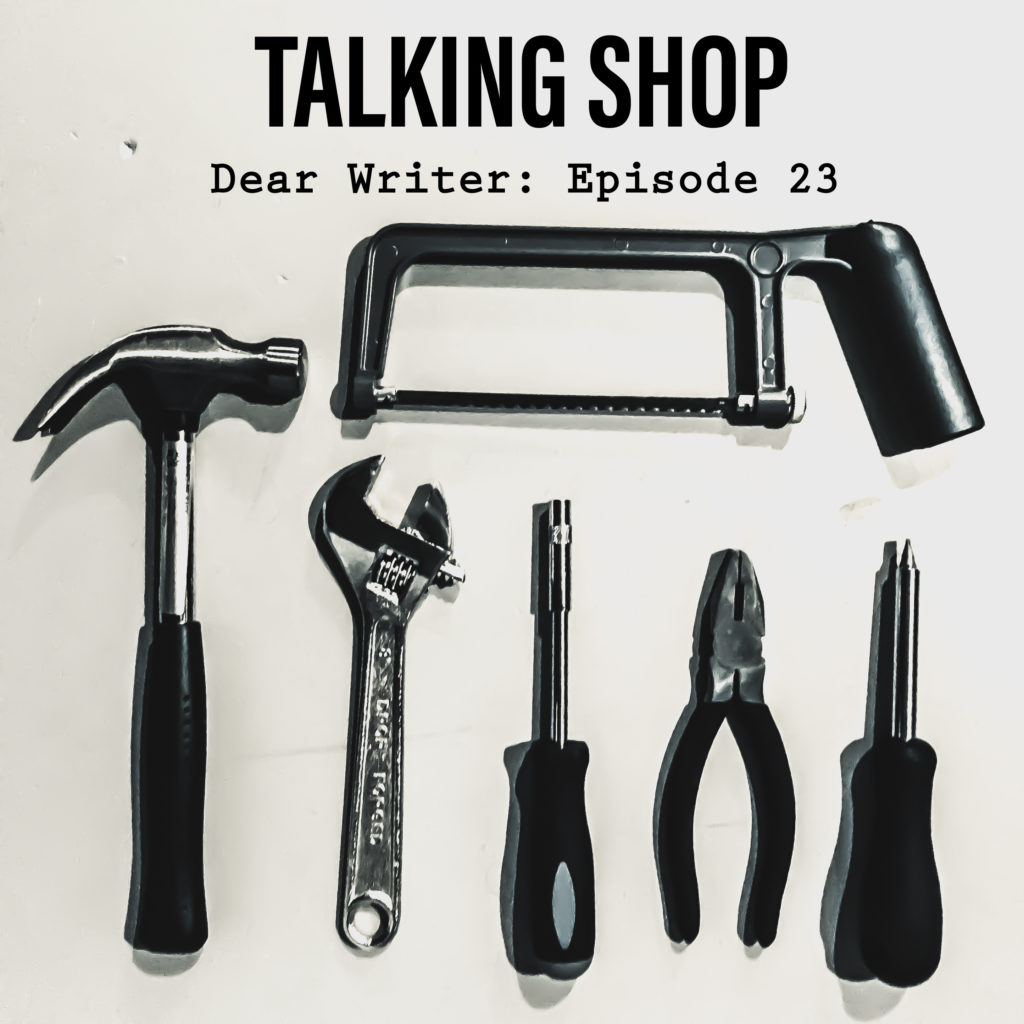
Transcript
Ashley: Hey everyone, welcome back to Dear Writer. This is episode 23, and this is one of our talking shop episodes. The fourth one of these talking shop ones, which is always… I always find it really fun to have a bit of a chat about the things that we’re reading. It’s always interesting to see what each other have been up to the past—what are we?—month or so, since we last recorded one.
Sarah: Yeah and I, you know, I guess most writers are avid readers as well, so I always find this very interesting because I always have lots of books on the go, even ones that we don’t mention on here. And sometimes it’s hard to choose.
Ashley: Yes, yes, I agree. So anyways, we should probably jump straight into it. My pick this month is a grammar book entitled Woe is I: The Grammarphobe’s Guide to Better English in Plain English by Patricia T O’Connor. And I really liked the cover. You’re not able to see it so I’m going to describe it to you. The ‘I’ is a person made with like quotation marks, um brackets and…
Sarah: It’s like curly hair.
Ashley: Anyways, so I enjoyed that.
Sarah: It’s like a classic, you know, when you have grammar faces with like colon, bracket.
Ashley: Yes!
Sarah: Well no, it’s not like that but—
Ashley: It’s similar.
Sarah: —you know how those sorts of things are made, it’s kind of a similar concept, I guess.
Ashley: Yeah. Except the ‘I’ is the body.
Sarah: Yes, yeah.
Ashley: So I’m probably about halfway through it, I’ve been enjoying it immensely which is you know something to be said about when you, about reading a grammar book. Mostly because it’s incredibly witty. I thought I’d read out a few of the chapter titles, because they made me laugh and I enjoyed it immensely. So one of them is, Plurals before swine: Blunders with numbers. Yours truly: The possessive and the possessed.
Sarah: That’s amazing.
Ashley: Death Sentence: Do clichés deserve to die? They’re very amusing some of these, the chapter titles and they have been given quite, they give a lot of helpful and practical advice about fairly common grammar errors. So, especially the Plurals before swine: Blunders with numbers about where you’re trying to put [an] S when you’ve got plurals before words that mean a plural like, both?
Sarah: Oh, right.
Ashley: You know, that kind of thing and you get confused about your sentence structure
Sarah: Like women.
Ashley: Yeah, yeah, stuff like that. So, or like, a couple. Is it, at that point are you referring to a couple as like a singular object, or are you referring to like as a couple as like more than one of a thing and then how you can get around all the grammar-y stuff to do with that, so.
Sarah: And it’s interesting like, I remember coming across—I don’t know if anyone else has had this, but—others can sometimes be slightly confusing. Because you’re like, does it belong to the other or the others?
Ashley: Yes!
Sarah: The others’ footsteps. Hang on, there’s more than one other so yes, the others’ with a…
Ashley: Yes, yes. So that’s what the Plurals before swine: Blunders with numbers chapter was all about which was quite helpful. It’s also very amusing because she often writes grammar poetry in it, so she’ll like make little limericks or something, to help you understand the concept. So I have one here, which I found very amusing. So this was meant to help you understand the difference between there, they’re, and their. So she wrote a poem which I think you’ll find, you’ll enjoy. So I’ll read it to you because I had a good laugh about it. All right.
They seem to have taken on airs, they’re ever so rude with their stares, they get there quite late, there’s a hand in your plate, and they’re eating was not even theirs.
It’s very amusing, but so there’s lots of these like little poetrys throughout all of—ah, poetrys—poems throughout all of the chapters. Oh my gosh, today is quite a day, I don’t know why I’m struggling so much.
Sarah: You need to read more of the grammar book.
Ashley: Yeah.
Sarah: Are you sure you’ve read this the whole way through?
Ashley: I’m halfway through. Halfway through.
Sarah: Oh okay, well that explains it. I’m joking, I’m sorry.
Ashley: Halfway… that’s fine. I’m halfway through. Although by far my favorite chapter so far has been Death Sentence: Do clichés deserve to die? Where she pens some advice about using clichés and then, ends the chapter with a whole list of her descriptions of overused clichés, which made me laugh a lot. So I thought I’d, I have a quote of her advice on using clichés which I quite liked, so I thought I’d share that with you guys. And you kind of get a feel for her writing as well, so.
There’s no way to eliminate all clichés. It would take a room full of Shakespeares to replace them with fresh figures of speech, and before long those would become clichés too. Vivid language is recycled precisely because it’s vivid, but think of clichés is condiments; the familiar ketchup, mustard, and relish of language. Use when appropriate, and don’t use too much.
I thought that was quite a good way of thinking about clichés.
Sarah: Yeah. And it is so true, you know, people turn things into clichés because they like the sound of it. So then someone else uses it, and someone else uses it, and before you know it you’re… it’s just lost all of it’s meaning.
Ashley: And then I think it’s sort of right about making up new clichés, because occasionally I want to use a cliché, and I’m like oh it’s a cliché, maybe I should like slightly change the cliché. And it sounds even worse, you’re like oh my gosh no, I can’t put this in.
Sarah: You’re like, it just looks like you’ve got it wrong and confused.
Ashley: Yes, so I guess sometimes it’s okay just to use the cliché if you have to.
Sarah: Think once I had accidentally written something like, the brightest tool in the box or something. And then my younger brother who’s great at pointing these things out, he was like, don’t you mean the sharpest tool in the shed?
Ashley: You’re like, mmm, maybe you just weren’t use this at all. Oh that’s really funny. So I’ve written down a few of her overused clichés and her descriptions of them, because I found them funny and I thought you would also find them funny, so I’ll go through a few of those. So, ‘agree to disagree’. And then she’s described as, people never really agree to disagree, they just get tired of arguing.
Sarah: So true, so true.
Ashley: Very true. So then, ‘blessing in disguise’, and then she comments, not disguised well enough.
Sarah: Also true.
Ashley: Right, um. ‘Bone of contention’ this geriatric expression is getting osteoporosis.
Sarah: I haven’t actually heard that one, so maybe it truly is geriatric now. Or maybe I’m just behind.
Ashley: Maybe it’s overused, I don’t know. ‘Days are numbered’ a phrase that’s not just overused but depressing.
Sarah: Yeah, no kidding.
Ashley: And then um, ‘draw a blank’. And she says, that’s what you do when you run out of clichés. I was like, yes. So anyways, that’s my tool of the month, Woe is I.
Sarah: I might have to get that one, I think I would really enjoy that one.
Ashley: I think you would enjoy it too, it’s quite amusing.
Sarah: It sounds along a similar vein to Benjamin Dreyer’s book, Dreyer’s English..
Ashley: Yes, yeah. So it’s very enjoyable, I’d highly recommend you go check it out, if you want a more light-hearted grammar book.
Sarah: I love light-hearted grammar books.
Ashley: So what’s your choice for this month, Sarah?
Sarah: So mine is a book that I recently acquired. I’d been wanting this book for quite some time, but I was waiting for like Christmas, and then I didn’t get it at Christmas, and I was like oh. So, then, I was like well fine I’ll put it on my birthday list, because I wasn’t super wanting to spend a lot of money on it, although I was almost at that point where I was like, I’m just gonna buy it myself. But my younger brother previously mentioned—thank you Matthew—he got it for me for my birthday. And it is called Writing in the Dark.
Ashley: Oh, that’s a good cover.
Sarah: It is a good cover, it’s got glow in the dark words for ‘dark’, and it’s got almost a little skull but then it kind of merges into like a quill point end, what do you call them? A nib?
Ashley: Nib? I’m going with nib. People might correct us.
Sarah: Yeah, that’s what I thought too, but we’ll see. Anyways it’s by Tim Waggoner, and I haven’t fully read through yet, but it is so far proving to be worth its money. It’s about horror writing, specifically. Though I do think it’s useful for other genres too, like obviously Ashley and I have written young adventure, ergh, young adult adventure thrillers. Yeah, so the chapter headings give you a good insight into what the book covers which is basically everything from how to build a better monster to kindling emotions of dread, terror, horror, shock and disgust in your readers. And it defines each of those emotions as well, and sort of how to create them. And to the psychology of fear, and writing suspense. Yeah, I’m clearly getting a bit more into the horror themed writing at the moment, um. Not entirely sure why.
Ashley: It sounds real interesting.
Sarah: Yeah.
Ashley: Cause I was going to say, a lot of the emotions, like sure some of the horror and disgust is often you know, maybe not going to be in everyone’s novel. But I feel some of the other stuff like dread, terror, shock, definitely are elements of a lot of books. Especially our teen fiction. And then, psychology of fear as well, like our characters that terrified often, so it’d be… it’s quite interesting.
Sarah: Well, I mean every book has a certain amount of conflict in it. If you don’t have conflict within a book, then you basically don’t have a story. And typically if you’re having conflict, you’re probably going to have some of these emotions come up in some ways, whether it’s just fear of like losing someone, or like, you know, in romance you might have fear of losing someone. So, you’re… you are going to face these emotions, whether you’re writing horror or not. Some of the book has you know, like writing monsters is a little bit more specific to the horror genre. But even then.
Ashley: Because we’ve got villains at our book.
Sarah: Yeah exactly, and I have a great quote that actually I’m going to go straight to this quote which describes what he has to say about monsters. So he said,
The prime qualities of a monster, literal or symbolic, human or inhuman, are ugliness, distortion, violence, cruelty, savagery, wildness, and otherness. Anything can become a monster in your stories if you imbue it with one or more of these qualities.
So you know, you might think of your monster as your villain, or might be something that is even totally inanimate. Might be something that they’re just, your character has this really intense fear about could become sort of a monster. Or you could view it that way if you are reading this book for genres, like you don’t have to write horror to necessarily be able to get a lot out of this book, I feel. Basically what I want to say. But he does, he has some really practical actionable tips. And many examples and exercises to complete.
Ashley: Oh yeah.
Sarah: Like at the end of each chapter he’ll have like a couple exercises that you can do. I think the writer is actually a professor, so he’s published close to fifty novels and seven collections of short stories. He’s also written sort of tie in fiction for like some big things, like Supernatural, Grim, X Files, Alien, Doctor Who, Nightmare on Elm Street, Transformers among others and I’m basically just reading this about the author at the back. But yeah he’s received the Bram Stoker Award for superior achievement in long fiction, multiple finalist for both the Shirley Jackson Award and Scribe Award. Yeah, he’s well written and knows a lot about what he’s talking about is I guess what I want to say so, I would definitely recommend his book and he presents it in such a way that you can like quite easily understand and translate things into your own writing. So he gave some tips regarding suspense just for a bit of an example, there were quite a few but I’ve just picked a couple of them. So he said,
Make your character a normal person. A normal person doesn’t have special training, skills, or abilities to help them deal with threats. That increases suspense because they can’t easily deal with the threats physically, mentally, or emotionally.
Ashley: That is a very good point.
Sarah: Yeah. You know like, even if your character has some sort of supernatural quality, even if they’re like the Clark Kent of your world, that doesn’t mean they don’t have the kryptonite, so. Talking about clichés. But so you know, you’ve got to have that weakness or the reader is not going to feel worried for your character and you’re not going to be able to create that suspense, right. He also said,
Give the reader a superior viewpoint. If the readers know a bad thing is coming, even if the nature of that bad thing is unclear, and the character doesn’t, suspense is created.
We’ve done this quite a lot in our books.
Ashley: We have, I was just thinking that, I was like, ah yes.
Sarah: I think we’ve described it before in other podcast episodes as dramatic irony, which is a term I learned from the story grid.
Ashley: It’s definitely something, because we use multi perspective, it’s a lot easier for us to have this effect happen, because you can easily put in things that only one character knows and others don’t. And then you can see, I guess, stuff coming. Which definitely gives a feeling of suspense, I think.
Sarah: Definitely. So and then as a final sort of piece of advice, I chose a little part that he wrote about avoiding clichés and tropes. He said,
Don’t go with your first idea or even your second, and be suspicious of your third one. No matter how hard we all try, the first ideas we come up with often retreads of something we’ve seen or read before without our realizing it. Toss out your first few ideas, or at least keep massaging them until they’re no longer run of the mill.
And I highly recommend that. It’s so easy to just be like oh, I’ve had this great idea, but then later on you realize, actually you’ve just stolen that from like a book you read a year ago or something.
Ashley: I was gonna say we had this exact problem, a couple weeks ago when we were trying to figure out what to do with the beta comments, comments from our beta reader.
Sarah: Mmm. We often accidentally steal from ourselves. And we’re like, oh wait we’ve already done that, more or less.
Ashley: So we ended up going through quite a few renditions of what we could do.
Sarah: Yeah.
Ashley: In the plot to make to make the cards fall. So yeah, we did go through quite a few ideas before we landed on the one that we’re going to use.
Sarah: It was really tricky because some situations it feels like there’s only one fix for it. But you really do have to dig hard and go like, no. There cannot just be one solution to this problem.
Ashley: Yeah, you can’t just do this. Yeah, there’s gotta be something else.
Sarah: There has to be more than one solution. And if you try hard enough, and think long enough, you can get there. And it might seem a bit strange when you first come across it, but the more you develop that idea, the more you kind of begin to think, okay, actually this could become realistic as long as I do this, this, this. And you might have to change some things in order get there. But you can get there.
Ashley: Yes, that is what we had to do.
Ashley: Sarah came up with the idea, but she was like, ah, it’s a bit weird.
Sarah: Yeah. I think I came up with like an idea before the one that we finally settled on as well, and we were like hmm, it just didn’t quite feel right. And I also felt that it was sort of cliché. It was like, this is a really cliché way of dealing with the problem, this is the second most cliché way of dealing with the problem, and it doesn’t really feel right. So hopefully our third one is not cliché.
Ashley: Hopefully not. It’s at least a little, adds a little extra dynamic, I think, to it. Which the others didn’t.
Sarah: I agree. But yeah, so that was my choice, was Writing in the Dark by Tim Waggoner, so I would highly recommend you pick that up. And actually it was quite funny, I heard about this book on a podcast that I was listening to, which is another great—I mean, aside from our podcast—it’s a great reason for listening to podcasts because sometimes you do you hear these interviews with these authors, and they’re talking about the book and you’re like oh actually, that could be really useful. So actually if you go… I don’t know if it’s still there or not, because as we’ve discussed before on The Creative Penn, her episodes drop off after a little while. But, if you go on The Creative Penn it may still be there, I have no idea where, but there may be an episode with Tim Waggoner where he talks about this book, so.
Ashley: Is that where you heard about it.
Sarah: Yes. And then I looked on the back, actually, and it was quite funny because a long time ago, Ashley and I were in a writers group in Tauranga, and one of the writers in the writers group, she’s done really well. I remember her first name being Lee, but I can’t remember… Lee Murray, that’s right. So she’s written The Path of Ra series, and she’s also a New York best seller, I think now.
Ashley: I believe so.
Sarah: But yeah so she’s one of the people who have written like a little endorsement, I feel like there’s enough term for that, but we’ll go with that.
Ashley: Yeah it probably is, this is like us with the pen/nib thing. I don’t know if that’s right. It seems to describe what we’re trying to talk about.
Sarah: Oh my God. Yes, so I was like wow, it’s not often that you pick up a book and then find someone you know, has endorsed it. So then I felt like I had to buy it if she’s endorsed it, and she knows what she’s talking about.
Ashley: Yeah, she gives us lots of helpful tips at the, in the writing group, and she was really lovely so.
Sarah: Yeah.
Ashley: I trust what she says.
Sarah: Mm. Anyways should we move on?
Ashley: Yeah, yeah.
Sarah: What have you been reading for fun recently?
Ashley: I think I talked about this last time, I have been struggling so much to find books that engage me right from the start. I don’t know why, what it is, maybe it’s just me at this time in my life just not being able to one, finish things, two, you know, just not really sure what I, I guess, want to read. So anyways I was complaining about this fact to some of my lab mates at work, and one of them was like ah, do you like reading teen fiction? And I was like mm, I dabble. I dabble. I dabble sometimes. And he suggested this book, We All Looked Up by Tommy Walich. And so I went and got it from the library, because I was like I need something, and I’ve been enjoying it quite a lot. I’m about maybe like ten chapters through?
Sarah: Oh yeah.
Ashley: Yeah, quite a cool cover, I’ll show you, very teen fiction-esque.
Sarah: Oh yes.
Ashley: You can’t see it, but it’s like the titles all in lights, like little light bulbs, and then it’s got some teenagers like sitting with blankets, looking up at the sky.
Sarah: Is that a campfire in the middle?
Ashley: Uh, unsure. No, it’s someone with a blanket.
Sarah: Oh. Okay. Right, I see. It looked like a campfire.
Ashley: So, I might just read to you the blurb from the back, because it describes it quite well. So blurb on the back is
‘Before the asteroid, we let ourselves be defined by labels, the athlete, the outcast, the slacker, the overachiever. But then we all looked up, and everything changed.’
So it’s a book that follows a group of high school teenagers, they’re in their final year of high school, and it follows what they do when they find out that they only have two months to live because an astroid is about to hit and destroy the world. So, I’ve been enjoying it a lot actually. Especially it’s been quite obviously interesting reading it in pandemic times, because it does kind of make you think a little bit about it. But yeah it’s multi-perspective but third person, which works really well for this book because you’re following all of the archetypes. Each character’s like, as it says, like the athlete, and the really smart one, and the deadbeat one, and so it’s quite interesting. You know currently like where all their lives are at the moment, that’s what I’m up to. All of their problems, and all the things that they’re worried about. But obviously there’s foreshadowing through the whole thing. There’s this asteroid that’s coming, and I’m up to the part where they’ve just discovered, like it’s just been on the news that there’s a 66% chance that the asteroid’s going to hit in two months and destroy the world. So they’re all now like, what do we do with our lives? So I’m liking it a lot. It’s written well.
Sarah: It sounds good, yeah, sounds like one that I would quite like too.
Ashley: Oh, and the other interesting thing is he wrote an album to go with it, which is another reason why my lab mate recommended it. Because we were listening to a playlist in the lab and he’s like, these are very weird songs, and I was like explaining that we often pick songs that match some of the chapters that we’re writing. And then he was like oh, there’s this book, and I was okay. So yeah there’s a, the guy’s also written an album that goes along with it, to match it.
Sarah: That’s cool.
Ashley: So I thought that was quite cool. Definitely recommend, We All Looked Up. What’s your book for this month?
Sarah: Well, continuing on the sort of apocalyptic and horror theme we’re running on today, I read Bird Box, which—well I don’t know whether people know it now, because it is a Netflix film now so more people know it—but I actually heard about the book on a podcast I was listening to ages ago, this one was on the storygrid, which I heard about it. And I was reminded of it when I was like looking, searching for a good movie to watch, I saw a Bird Box was out on Netflix. And I didn’t, like I have watched it, but I didn’t suggest it to watch at that point, because my husband Dan doesn’t like horrors. So, I watched it by myself and the middle of the day, to be safe. But I had already read the book at that point, I decided to read the book first. The book is far better than the movie, as books often are. I should mention sorry, Bird Box is by Josh Malerman is who wrote it. And, as I said, the film is terrible compared to the book. Well it’s not terrible it’s just they changed way too much, let’s just put it that way. They even changed the character’s names. And I was like why is that necessary? Why do you need to change the names of these people? Does that matter?
Ashley: We’re they weird names in the book?
Sarah: No, it was like Cheryl and… I can’t even remember. But, I’m just like there’s nothing wrong with Cheryl, why did you change it? And they made her like a random old woman instead. But there was like multiple things. Some of the changes I could see were, you know, to adapt it to the TV, like. But some of them were totally necessary. Anyways, the book is about a woman who finds out she’s pregnant basically on the verge of the Apocalypse. And it alternates between her past experience of getting through the first year after the apocalyptic event happened, and then the present, which is like several years later, where she’s trying to escape her situation with not one, but two children. There are creatures outside, in quotation marks, and if you see them you go crazy and homicidal slash suicidal. So, whenever they go outside, they have to put on blindfolds, so that’s basically the setup of the book. And I think it was really effective just because it literally takes a sense away from the character and away from you, so she’s blindfolded, you’re blindfolded. You have no idea what these creatures look like, what they can do. You just know that there’s creatures out there, and if the woman, Malorie, sees them she will probably die, so. And, yeah. I also, I read the second book as well, which is called Malorie after the protagonist and the second book wasn’t quite as good as the first book, I felt. That one was more multi-perspective, because it had the perspectives from her children as well. But, yeah, I just… it didn’t quite hit the same notes. I will say, though, that the second book was created very recently, like I think it’s just come out, and so he probably had a bit of influence from the pandemic coming through into it. Which, I saw a review on goodreads and someone was upset about that, but I thought it was actually kind of cool, because I was like, yeah I feel like it adds more realism. I can’t remember what the line was. Oh yeah that’s right, it said something like there was only safe and unsafe, and I was like thinking about the pandemic and I was like, clean or unclean.
Ashley: That’s quite funny.
Sarah: Yeah, especially being an operating room nurse. Yeah, it resonated with me let’s just say that. That line in particular. But yeah so that one was that I highly recommend that book, it is a horror, again, but it’s not like super gruesome or anything it’s more suspense, and you know, like, I guess, there’s creatures in it that give it kind of that horror feel.
Ashley: Yeah. It sounds really interesting especially, I know the movie you’re talking about, I haven’t watched it because I don’t like horror movies, but the book sounds very intriguing because if the character’s blindfolded that would make it really… I don’t… It just intrigues me, you know. I’m like, oh okay, so you don’t know a lot then as well, which is quite cool.
Sarah: Yeah, she’s not blindfolded while she’s in the house and stuff, but every time she travels outside the house, they have to put these blindfolds on and then it’s like, because you know, it’s the apocalypse, there’s like cars all over the street and the occasional body. And so they trip over things and you’re like oh my god, what was that?
Ashley: Is it in first person?
Sarah: No, I don’t think it was. I can’t really remember it, to be honest. I don’t think so.
Ashley: Just curious, just curious about how he did it, that was all.
Sarah: But yeah, I thought the structure was quite interesting, especially in the first one. Because basically when it starts off, like the one situation is all these people who have conglomerated in the house, that she’s with. And then you get the other perspective of years later, there’s just her and the children. And so you’re like, well something happened.
Ashley: Yeah.
Sarah: These people must have died, somehow, so you know it’s gonna happen, but you have no idea how it happens.
Ashley: Right.
Sarah: It’s kind of interesting.
Ashley: That’s really cool. It does sound interesting, I’m just so interested in the, like, structure of how he wrote that. That’s really cool.
Sarah: Yeah. But also, I have been making steady progress on Stephen King’s It, which we talked about in a previous Talking Shop episode. I’m still reading it.
Ashley: It’s a long book, I’m not surprised you’re still reading it.
Sarah: And, to end on a lighter note, I found a really touching paragraph in the book, which is kind of why I like horror. And it sounds cheesy, but I feel like it really does shine a light in the darkness sometimes. So I thought I’d share that with you guys, just so you don’t think on entirely insane for being interested in all these super dark stuff. Anyways, so it goes,
Maybe, he thought, there aren’t any such things as good friends or bad friends—maybe there are just friends, people who stand by you when you’re hurt and who help you feel not so lonely. Maybe they’re always worth being scared for, and hoping for, and living for. Maybe worth dying for, too, if that’s what has to be. No good friends. No bad friends. Only people you want, need to be with; people who build their houses in your heart.
Ashley: Oh that is really sweet.
Sarah: I just thought that was a really sweet… like that’s something you don’t expect to find in a Stephen King book.
Ashley: No, especially because I know a decent chunk about what’s in that book, and It. And so I’m kind of like, oh well, that’s a nice little thing in there, even though some of it’s really disturbing.
Sarah: I think it’s, you know, it’s also like, despite being a story about like this horrifying clown, it’s also a story about a group of kids who draw together in the face of evil, so. It is quite cool. In that sense. In that sense that they all get really close, and that was a really sweet paragraph. I was quite touched.
Ashley: Shall we end on that paragraph, then.
Sarah: Yeah, yes.
Ashley: Okay. Next time on Dear Writer, we’re up to our main podcast again, and this time we’re going to talk about how Sarah and I go about researching a novel, and some of our tips and tricks for researching better and smarter.
Sarah: Yeah, just to reiterate that there are still some spots left on our author spotlight section. So just go to our website at www.lindersoncreations.com, and then if you go to the podcast section you’ll find the ‘Be Featured on Dear Writer’ and it’ll give you a little form to fill out, and we’d love to have a chat to you.
Ashley: Yes.
Sarah: We don’t bite.
Ashley: No, we’re very friendly, and we love learning about other authors and their journeys. It’s so interesting. Yeah. If you’d like to know more about us or any of our writing projects, you can one, visit us at lindersoncreations.com. Or you can contact us on Facebook or Instagram, which is also under @lindersoncreations. I hope you enjoyed the show, and please rate and review us on your podcast of choice and we’ll be back next week. Happy writing everyone.









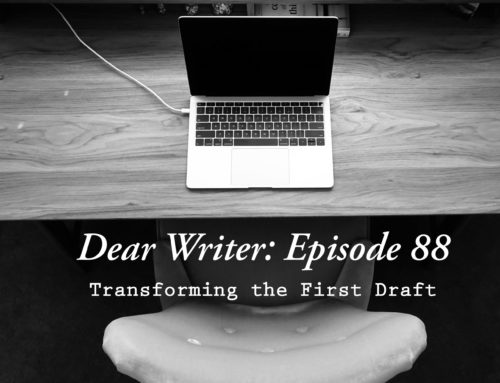
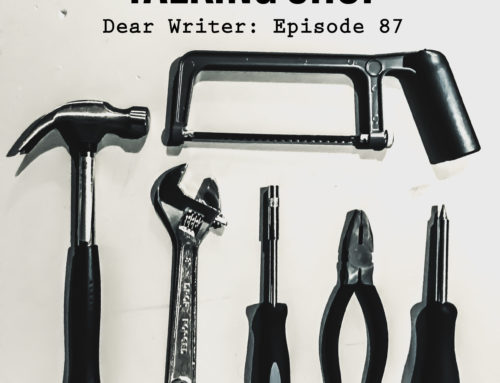

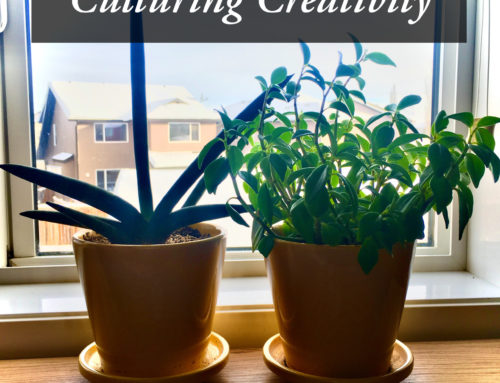

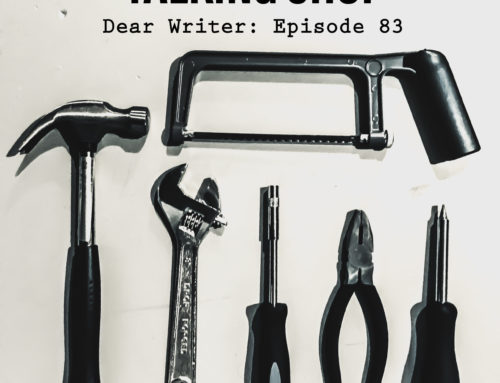


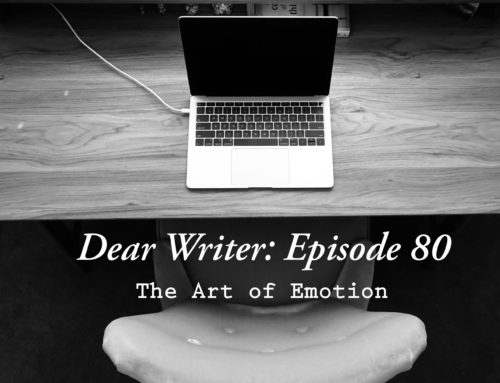
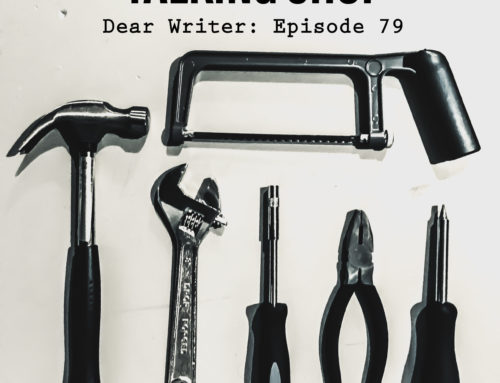
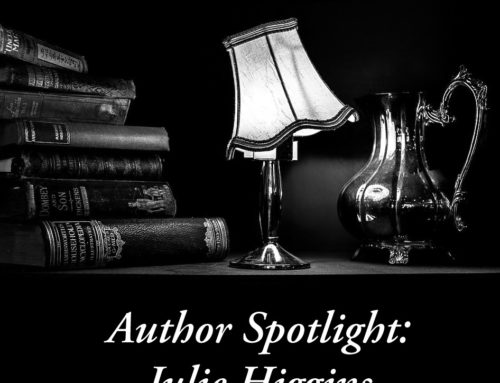
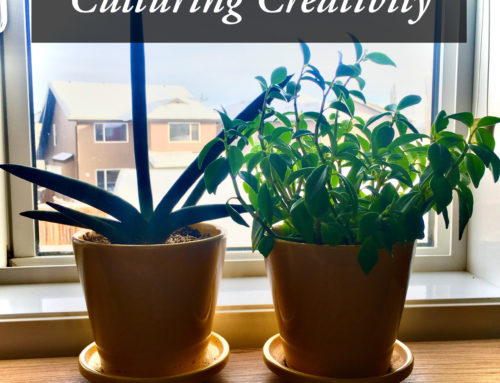
Leave A Comment